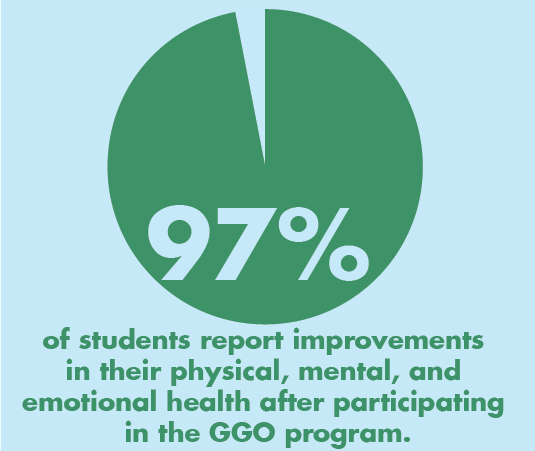GGO’s Scientifically Proven Benefits
GGO is active in assisting ongoing research on the health benefits of time in nature. Learn more about these studies and how they inform our curriculum.
A word from Dr. Christine Ekenga, a trusted GGO Research Partner:
“The goal of my research is to promote health and well-being for all through healthy environments”
Sustainability, “Green vs. Screen: Exploring the Outcomes of an In-Person and Virtual Nature-Based Environmental Education Intervention for Low-Income Children” (2022)
“Children who participated in the in-person intervention reported higher post-intervention levels of nature exposure, perceived neighborhood safety, self-confidence, and self-efficacy than children who participated in the virtual intervention.” Read this scientific article, co-authored by GGO Founding CEO and President Nadav Sprague that finds that students who participated in GGO programming in-person experienced more positive outcomes than those who participated in virtual programming.
Journal of Public Health, “The Impact of Nature-Based Education on Health-Related Quality of Life Among Low-Income Youth: Results from an Intervention Study” (2022)
“Nature experiences have been shown to promote physical, emotional, mental and overall health. However, low-income youth often face inequities in access to nature.” Read this scientific article co-authored by GGO Founding CEO and President Nadav Sprague that evaluates GGO’s model for nature-based education and finds that GGO’s program improves participants' health-related quality of life.
Journal of Urban Health, “The COVID-19 Pandemic as a Threat Multiplier for Childhood Health Disparities: Evidence from St. Louis, MO” (2022)
“As equitable access to quality education is an upstream determinant of health, there is great concern over both the short-term and long-term impacts of this digital divide on the health and behavioral risk factors of both non-White and low-income children. In the current study, we examine the impact of the COVID-19 pandemic on health behavior outcomes among St. Louis Public Schools District (SLPS) students.” Read this scientific article co-authored by GGO Founding CEO and President Nadav Sprague that finds children who are more likely to be diagnosed with COVID-19 are also more likely to develop worse eating habits, spend less time sleeping, and spend less time outdoors.
Environmental Health Perspectives, “A Cluster Analysis of the Social and Environmental Health Impacts of the COVID-19 Pandemic among Low-Income Youth” (2021)
“In this cross-sectional study, we examined the social, environmental, and health impacts of the pandemic on low-income youth in the St. Louis metropolitan area, an urban region with longstanding racial and income disparities in education and health outcomes.” Read this abstract, co-authored by GGO Founding CEO and President Nadav Sprague and presented at the International Society for Environmental Epidemiology annual conference, that suggests the negative impacts caused by the pandemic cluster, and these clusters differ by race and family structure.
International Journal of Qualitative Methods, “Enhancing Educational and Environmental Awareness Outcomes Through Photovoice” (2021)
“In the United States, there are substantial barriers to youth nature access and environmental education (EE). This study investigated the impacts of a Photovoice EE intervention on the environmental perceptions, STEM-capacity, and environmental awareness of 335 low-income, urban youth (ages 9–15).” Read this scientific article co-authored by GGO Founding CEO and President Nadav Sprague and Chicago VISTA Leader Zoe Kaufman that finds a positive correlation between Photovoice EE intervention and STEM-capacity and environmental awareness.
Environmental Health Perspectives, “The Effect of Nature Based Environmental Education on the Health Related Quality of Life of Low Income Black and Hispanic Youth” (2020)
“Nature-based education (NBE) uses nature contact to promote healthy behaviors and academic success in youth. However, few studies have evaluated the health outcomes of NBE. In this prospective study, we evaluated the impact of NBE on the health-related quality of life (HRQoL) of low-income, urban Black and Hispanic youth.” Read this abstract, co-authored by GGO Founding CEO and President Nadav Sprague and presented at the International Society for Environmental Epidemiology annual conference, that suggests nature-based education is a low-cost method for improving HRQoL for low income, urban, Black and Hispanic youth.
Sustainability, “Promoting Health-related Quality of Life in Minority Youth through Environmental Education and Nature Contact” (2020)
“Few studies have examined the relationship between environmental sustainability education and health outcomes in youth. The purpose of this study was to examine health-related quality of life over a 13-week time period in a sample of urban minority youth who participated in an environmental education program with a nature contact component.” Read this research article co-authored by founding CEO Nadav Sprague that finds a positive correlation between engaging with the natural environment through environmental sustainability education (administered by GGO) and health incomes in youth.
Health Equity, “An Analysis of the Educational and Health-Related Benefits of Nature-Based Environmental Education in Low-Income Black and Hispanic Children” (2020)
“Low-income and non-white children experience disparities in health, education, and access to nature. Recent research suggests that nature contact may reduce these health and educational disparities for urban low-income populations.” Read this scientific journal article, co-authored by GGO’s CEO Nadav Sprague, in which GGO programing led to improved STEM capacity and health-related quality of life
Meet the Researchers
Dr. Christine Ekenga, Ph.D., M.P.H.
Assistant Professor with research focus on environmental health and the epidemiology of chronic diseases at Emory University in St. Louis
Ph.D., New York University Graduate School of Arts and Sciences
Masters of Public Health, San Diego State University Graduate School of Public Health
Nadav Sprague, M.P.H.
Ph.D. student in Epidemiology, Mailman School of Public Health at Columbia University studying Epidemiology
Masters of Public Health, Brown School at Washington University in St. Louis
Bachelor’s degree in Environmental Earth Science, Anthropology, and Writing , Washington University in St. Louis






